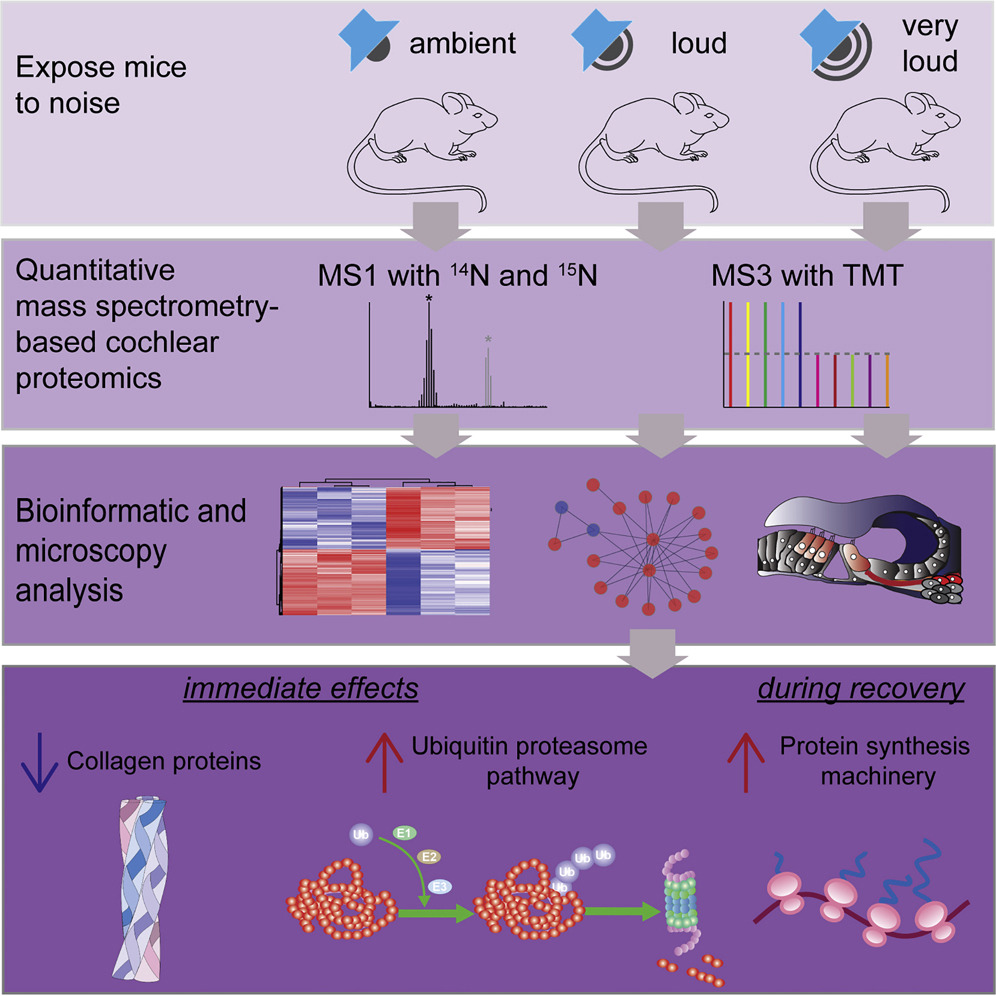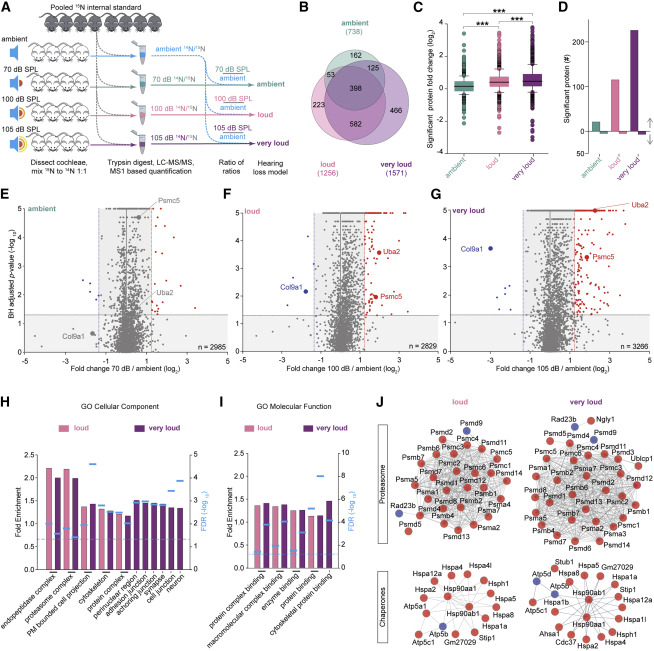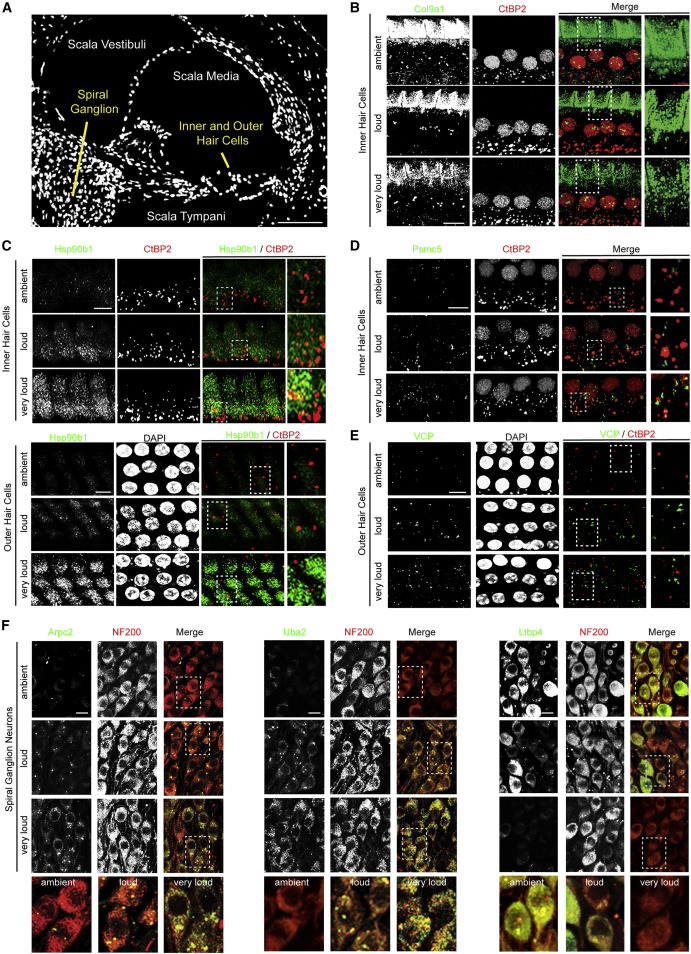


ผลของเสียงดังในระดับที่ส่งผลให้เกิดการสูญเสียการได้ยินส่งผลต่อการเกิดสภาวะเครียดและความเป็นพิษต่อโปรตีน และการเกิดการกระตุ้นของเครือข่ายการรักษาสมดุลโปรตีน
Highlight:
การได้ยินเสียงที่ดังมากเกินไปจนถึงในระดับของมลภาวะทางเสียงนั้นสามารถส่งผลให้เกิดการสูญเสียการได้ยินได้ โดยกลไกที่ทำให้เกิดการสูญเสียการได้ยินนั้นเกิดจากสาเหตุของระบบประสาทการได้ยิน การศึกษาวิจัยครั้งนี้ได้ทำการศึกษาถึงผลกระทบที่เกิดขึ้นจากเสียงในระดับต่างๆ ต่อการเปลี่ยนแปลงของโปรติโอมและการวัดการทำงานต่างๆที่เกิดขึ้นในโคเคลีย การศึกษาโปรติโอมิกส์เชิงปริมาณในครั้งนี้พบว่าการได้รับเสียงดังนั้นส่งผลให้เกิดสภาวะความเป็นพิษต่อโปรตีน (Proteotoxicity)
ที่มาและความสำคัญ
การศึกษาถึงการตอบสนองของระบบประสาทการได้ยินในโคเคลีย ต่อการกระตุ้นของเสียงที่อยู่ในระดับที่เป็นมลภาวะทางเสียง การศึกษานี้เป็นการศึกษาถึงการเปลี่ยนแปลงที่เกิดขึ้นในระดับโปรตีและทรานสคริปโตม เพื่อที่จะได้มาซึ่งข้อมูลของโปรตีนและยีนที่สามารถนำมาใช้เป็นเป้าหมายในการรักษาหรือป้องกันอันตรายที่เกิดขึ้นจากมลภาวะทางเสียงได้
Summary
Exposure to excessive sound causes noise-induced hearing loss through complex mechanisms and represents a common and unmet neurological condition. We investigate how noise insults affect the cochlea with proteomics and functional assays. Quantitative proteomics reveals that exposure to loud noise causes proteotoxicity. We identify and confirm hundreds of proteins that accumulate, including cytoskeletal proteins, and several nodes of the proteostasis network. Transcriptomic analysis reveals that a subset of the genes encoding these proteins also increases acutely after noise exposure, including numerous proteasome subunits. Global cochlear protein ubiquitylation levels build up after exposure to excess noise, and we map numerous posttranslationally modified lysines residues. Several collagen proteins decrease in abundance, and Col9a1 specifically localizes to pillar cell heads. After two weeks of recovery, the cochlea selectively elevates the abundance of the protein synthesis machinery. We report that overstimulation of the auditory system drives a robust cochlear proteotoxic stress response.
KEYWORDS: proteostasis, noise-induced hearing loss, cochlear synaptopathy, neurodegeneration, quantitative proteomics
Citation: Jongkamonwiwat et al., 2020, Cell Reports 33, 108431
November 24, 2020, © 2020 The Authors.
https://doi.org/10.1016/j.celrep.2020.108431
RELATED SDGs:
3. GOOD HEALTH AND WELL-BEING

ผู้ให้ข้อมูล: ผู้ช่วยศาสตราจารย์ ดร.นพพร จงกมลวิวัฒน์
ชื่ออาจารย์ที่ทำวิจัย: ผู้ช่วยศาสตราจารย์ ดร.นพพร จงกมลวิวัฒน์
Tags: cochlear synaptopathy, neurodegeneration, noise-induced hearing loss, proteostasis, quantitative proteomics
